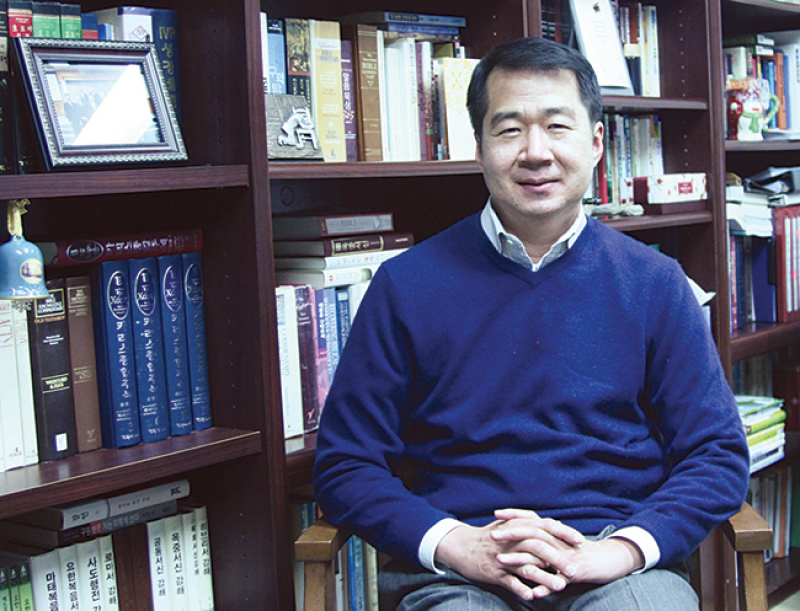
"I've been through their experiences -- having been a youth pastor, a college pastor, and an EM (English ministry) pastor before. I know their struggles and needs. So I just try my best to be their friend, someone who can listen to their worries."
Such was Reverend Nathan Kim's response when asked his approach to being a senior pastor. Kim is currently the lead pastor of Torrance Good Shepherd Church, but previous to planting this church 14 years ago, Kim has had 17 years of experience in various positions in the education departments of several Korean immigrant churches. Kim also describes himself as being a part of the "1.5 generation" -- a term used often to refer to those who were born in other countries but grew up in the U.S.
These professional and personal experiences inform his thoughts and approach to leading his church in unique ways, Kim said. He experienced pastors who seemed demanding but not supportive, and often felt that he was being used rather than appreciated -- the "same thing" that many Korean American pastors in education departments of Korean immigrant churches may be facing, Kim added.
However, Kim said he felt that all of these experiences have trained him to become who he is today.
"It was during those hard moments that I learned about humility, patience. That's when I learned to accommodate to the situation," he said. "Those experiences, and the fruits from those times, is what is helping me as a pastor today."
One of the most significant lessons he learned is that of submitting to leadership. During his years as a pastor in the education departments of various churches, Kim said, "Not all of the pastors that I met were people I felt I could respect easily."
"But I realized Christ is the head of the church, and all authority is from the Lord. We have to submit to the leadership of the Lord," he explained. "So the men that we see -- we don't respect them for their character or leadership, but because of Christ who is the head of the church. I have to see the Lord before I see the man. Because we're not submitting to man first, but we are submitting to Christ first of all. That's how we become humble, and that's what's pleasing to the Lord."
He went on to give examples of figures in the Bible that had to submit to leadership: David, Joshua, Joseph. "David went through so much suffering under Saul's leadership, and Joshua too -- I don't think Moses was perfect, and he also probably went through some pain and disappointment. But that's how God trained these people to be humble and to trust God."
His experiences have also motivated him to plant TGSC, and to become a senior pastor who can bridge the gap between the older and younger generations within the church, and mentor the younger Korean American pastors. He says there's a particular value in meeting with the pastors on a regular basis.
"We -- all of the education pastors and I -- have fellowship together once a month. I love to take them out and buy them food," he said. This space allows for them to talk not only about church, "but just about life, family, and other things. We joke around a lot."
Kim and the elders at TGSC also try to support the EM through actions, Kim said, such as by supporting their agenda and decisions, and serving them when they have events. For example, the elders would clean up the rooms or bring water before Bible studies or youth events, Kim elaborated.
These efforts to be "servant leaders" as the older pastor and the elders of the church are important to help develop the education department and build up the next generation, according to Kim, and these efforts are also appreciated by the education pastors. Most of the education pastors have served in TGSC anywhere from five to 10 years, and some have even come back after having left to other churches. The church currently does not have a lead EM pastor, but Kim said he would eventually be willing to let the EM grow into independence if they are ready.
"I don't think there's a perfect answer on what an EM should become, or how it should grow," Kim said, "and personally, I still think both the EM and the KM need each other. But if the EM is ready in their maturity and character to maintain their own leadership, I would be willing to let them go. It's really the character that matters, rather than the structure or model of what an EM should be."
"And to help build that character or maturity in the EM, I think the older pastors need to mentor and invest in the younger pastors," he added.
Kim said he asked his education pastors already if they would like to become independent. But, he said, every one of them responded with the desire to remain under "one roof," as one church.
As long as they are together, Kim said, "My focus is to be a stepping stone for them, to support them, and to build them. And our purpose as a church is to build God's kingdom together."



















